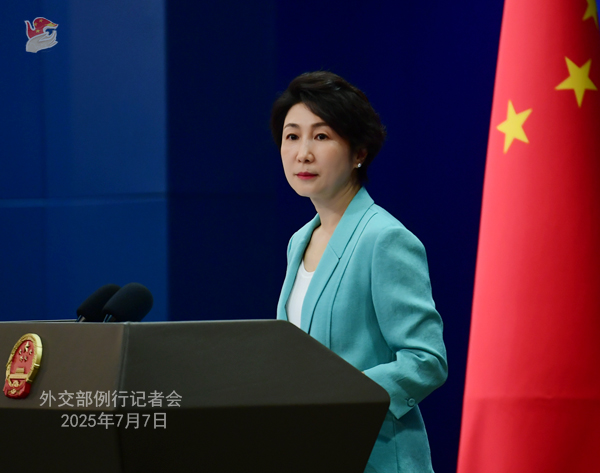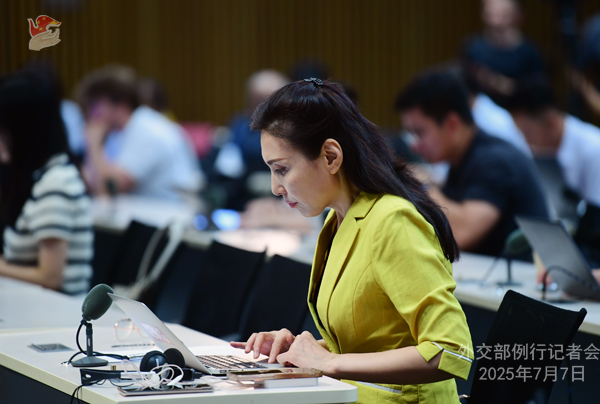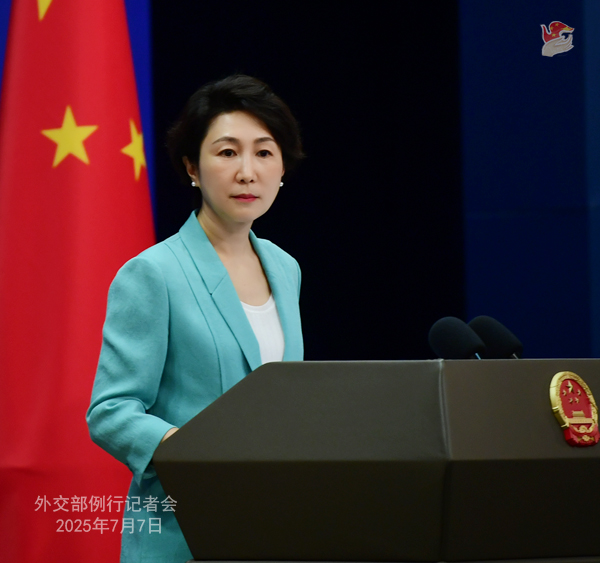
People’s Republic of China


CCTV: We noted that during Foreign Minister Wang Yi’s visit to Europe, climate change is a major priority in the EU’s cooperation proposal. How does China respond to that and what’s China’s view on working with the EU to advance energy transition and green and low-carbon development?
Mao Ning: Climate change bears on the survival and well-being of every nation and individual, and on the future of humanity. Tackling climate change requires a collective effort. China, while adjusting its energy mix and pursuing green development, is also working closely with the rest of the world to actively contribute to global climate governance.
Green is the distinctive color of China-EU cooperation. Both sides actively support low-carbon transition and green development, firmly uphold the international climate governance system based on the United Nations Framework Convention on Climate Change (UNFCCC), and share extensive common interests and enormous cooperation space on addressing climate change. Projects in this field, such as the Daya Bay Nuclear Power Station, the Thrace Wind Power Project in Greece and the Döllen solar park in Germany, are landmark achievements of China-EU green cooperation.
China is committed to delivering on green development and is a major contributor to this global cause. We stand ready to work with the EU to uphold multilateralism, fulfill the goals identified in the Paris Agreement, strengthen cooperation on mitigation and adaptation and green and low-carbon transition, and contribute to better global climate governance.
CGTN: We noted that Foreign Minister Wang Yi concluded his visit to Germany and France. Could you share more details?
Mao Ning: While in Germany, Foreign Minister Wang Yi met with German Chancellor Friedrich Merz, co-chaired the eighth round of the China-Germany Strategic Dialogue on Diplomacy and Security with German Foreign Minister Johann David Wadephul, and met with Foreign and Security Policy Advisor to the German Chancellor Günter Sautter. While in France, Foreign Minister Wang Yi met with French President Emmanuel Macron, had talks with Minister for Europe and Foreign Affairs Jean-Noël Barrot, and co-chaired with Barrot the seventh meeting of the China-France high-level dialogue mechanism on people-to-people exchanges.
Foreign Minister Wang Yi stressed that in a turbulent and rapidly changing world, as major countries, China, Germany and France have every reason to strengthen strategic communication and coordination, jointly practice multilateralism, oppose unilateralism and bullying, oppose bloc confrontation, and provide more certainty and predictability for the world. We need to implement the common understandings reached between the leaders of the countries, enhance understanding and mutual trust, maintain open cooperation, strengthen people-to-people and cultural exchange, properly handle differences and disagreements, and promote the sustained and steady growth of China-Germany and China-France ties. Since this year marks the 50th anniversary of the establishment of China-EU diplomatic ties, it is most opportune to enhance strategic cooperation between the two sides under the current circumstances. China is happy to see Germany and France, the core major countries of the EU, drive the EU towards strategic autonomy, and encourage the EU to form an objective, rational and correct perception of China, properly handle its economic and trade differences with China, and jointly move China-EU ties forward.
Leaders of both Germany and France said they place high importance on ties with China, and stressed that in a world fraught with risks and challenges, it’s important to maintain strategic communication between their countries and China. There needs to be more high-level exchanges, policy coordination and mutually beneficial cooperation. It is also important to properly handle disagreements and differences by respecting each other and treating the issues constructively. The two sides should also jointly address global challenges, inject more vitality into multilateralism, and prevent the world from falling into hegemonic conflicts and bloc confrontations. On the occasion of the 50th anniversary of the establishment of diplomatic relations, China and the EU should make strategic choices to become each other’s predictable and trustworthy friends and partners. Leaders of the two countries reaffirmed commitment to the one-China policy.
AFP: The BRICS Summit is about to close today. U.S. President Donald Trump yesterday criticized the “anti-American policies of BRICS” and threatened an additional 10 percent tariff on countries that align with the “anti-American policies of BRICS”. What’s China’s comment?
Mao Ning: BRICS is an important platform for cooperation among emerging markets and developing countries. It advocates openness, inclusiveness and win-win cooperation. It is not a bloc for confrontation. Nor does it target any country.
On the U.S. tariff hikes, China has made its position clear more than once. Trade war and tariff war have no winners, and protectionism leads nowhere.
PTI: On Friday, Deputy Chief of Army Staff Lt General Rahul R Singh has made some remarks about the recent four-day India-Pakistan conflict. He said China used it like a “live lab” to test various systems and was providing all possible support to Pakistan. During the four-day conflict, India was actually dealing with three adversaries: Pakistan, China and Türkiye. China has used its satellites to monitor Indian military deployment, and provided live inputs to Pakistan military during the talks, even the talks between India and Pakistan Director General of Military Operations were rather discussing the ceasefire. He said China has carried out its ancient military strategy of “36 stratagems” and killing the adversary with a “borrowed knife.” I also sought reaction from the Chinese Defense Ministry. But I would like to have your comments considering China’s support and close coordination, providing not simply material support but also operational backing to Pakistan even during the current normalization process of India and China. What is China’s reaction?
Mao Ning: I am not familiar with the specifics you mentioned. Let me say that China and Pakistan are close neighbors enjoying traditional friendship. Defense and security cooperation is part of the normal cooperation between the two countries and does not target any third party.
India and Pakistan are and will always be each other’s neighbors. They are important neighbors of China as well. Over the past weeks and months, China has closely followed the developments between India and Pakistan, actively promoted talks for peace, and worked to maintain regional peace and stability. China welcomes and supports India and Pakistan in properly settling differences and seeking fundamental solutions through dialogue and consultation. China stands ready to continue playing a constructive role to this end.
The China-India relations are at a crucial stage of improvement and development. We stand ready to work with India to move bilateral relations forward on a sound and steady track.
PTI: You said the China-Pakistan friendship is not targeted against a third party, but this is what precisely the allegation here that even during this confrontation, China was closely helping Pakistan at the cost of India.
Mao Ning: I’m not sure how that allegation came about. Different people may have different perspectives. What I can say is, China-Pakistan relations do not target any third party. This is China’s policy. On India-Pakistan relations, we support the two sides in properly addressing differences through dialogue and consultation and jointly keeping the region peaceful and stable.

Reuters: This is a follow-up on what President Trump said about BRICS. He mentioned levying an additional 10 percent tariff on countries that align with the BRICS’ what he calls “anti-American policies”. Is China engaged in any talks on this? Has China reached out to clarify what it meant and how it might affect China as well as what would China do if the U.S. does go ahead and impose this additional tariff on China?
Mao Ning: BRICS is a positive force in the world. It advocates openness, inclusiveness and win-win cooperation. It does not target any country. We oppose trade wars and tariff wars. Tariff should not be used as a tool for coercion and pressuring. Arbitrary tariff hikes serve no one’s interest.
AFP: The AP reported that China deployed its embassies to spread doubts about the performance of French-made Rafale jets after they saw combat in India and Pakistan’s clashes in May, French intelligence officials have concluded, implicating Beijing in an effort to hammer the sales of France’s fighter. What is China’s response?
Mao Ning: I’m not familiar with what you mentioned.
Global Times: It’s reported that on July 6, Indian Prime Minister Narendra Modi sent greetings to the Dalai Lama for his 90th birthday. Indian officials, including the Minister of Parliamentary Affairs, attended the celebration on behalf of the Indian government. What’s China’s comment?
Mao Ning: The position of the Chinese government on Xizang-related issues is consistent and clear. As is widely known, the 14th Dalai Lama is a political exile who has long engaged in anti-China separatist activities and seeks to separate Xizang from China under the cloak of religion.
India needs to be fully cognizant of the sensitivity of issues related to Xizang, see clearly the anti-China and separatist nature of the 14th Dalai Lama, honor the commitments India has made to China on issues related to Xizang, act prudently, and stop using those issues to interfere in China’s internal affairs. China has protested to India regarding its actions.
AFP: Last Friday, China announced that 34 brandy producers agreed to set a minimum price to avoid tariff levies, while other companies could still face tariffs. President Macron said this is a positive move towards the settlement of disputes. Does China agree that this is the first step towards further talks? What measures may be taken next?
Mao Ning: I’d refer you to competent authorities. Let me say more broadly that we hope and believe that China and the EU will solve specific economic and trade issues through dialogue and consultation.
Bloomberg: Trump has said that the U.S. will talk to China about TikTok this week to discuss the sale. He said that “we pretty much have a deal,” and that “we think we probably have to get it approved by China, not definitely, but probably.” We’re wondering if the Foreign Ministry has any updates on the latest talks over TikTok.
Mao Ning: China has repeatedly made clear its principled position on issues related to TikTok.
Reuters: The FT has reported that the EU is holding back on signing a joint declaration with China this month on climate action, unless China pledged greater efforts to cut its greenhouse gas emissions. Would China want for this joint declaration to be signed ahead of the China-EU leaders’ summit this month? Has China been looking at more climate pledges as well?
Mao Ning: I’d refer you to competent authorities for anything specific. Let me say that China is committed to green and low-carbon development. Over the past decade, the share of non-fossil fuels in China’s total energy consumption has gone up to 17.9 percent and carbon intensity has come down by over 34 percent. China will continue working with the rest of the world to enhance international cooperation on climate and contribute to global green transition and sustainable development.




